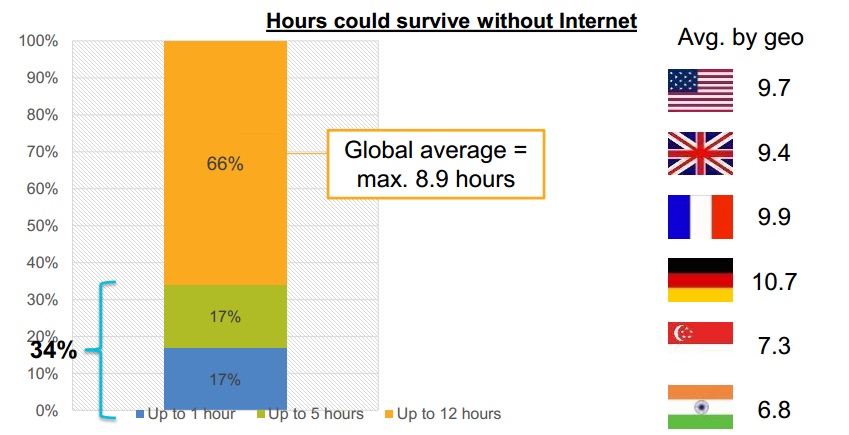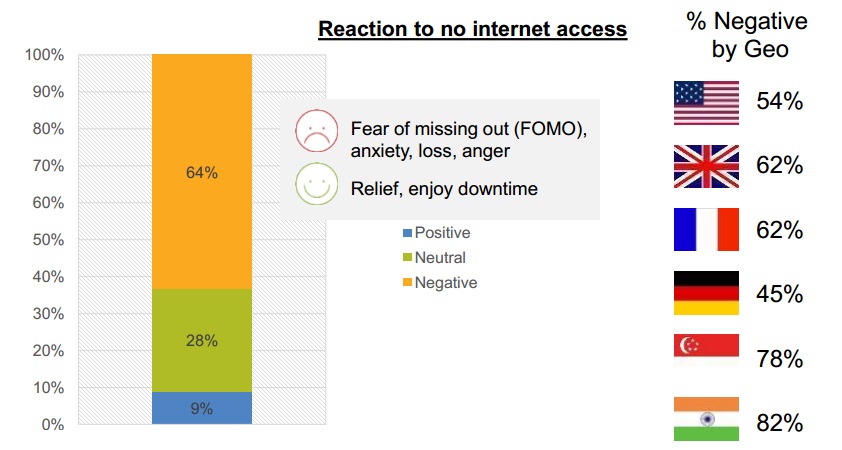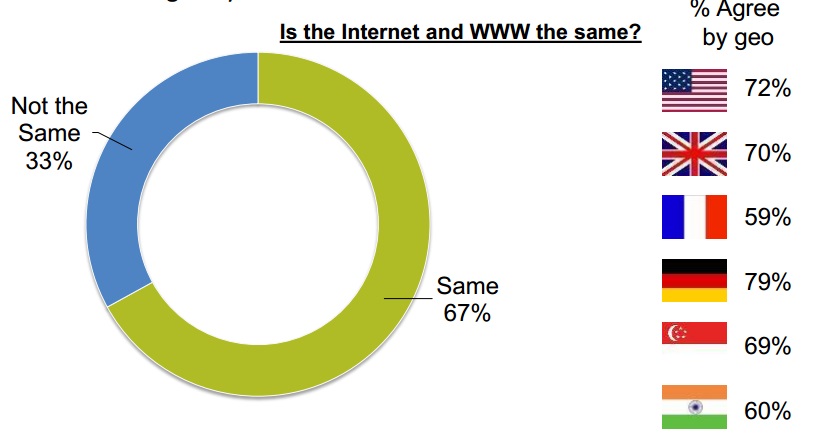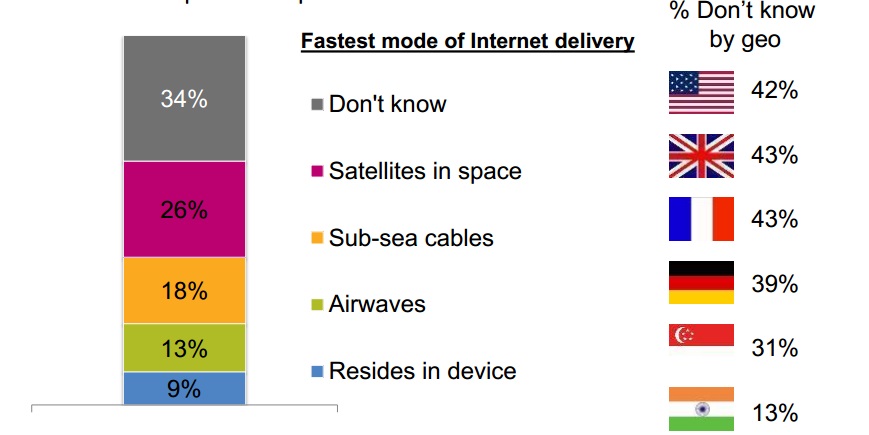The impact of the Internet on the world platform has been sensational. In the present scenario about 3 billion people are connected to the Internet that is approximately one third of the total population of the world and by 2020, the number of devices connected to Internet is expected to rise to 26 billion. Amidst this rising internet population and so many users coming online each day, it’s no less than a surprise that there is still a huge gap between the global audience knowledge and understanding of the Internet.
According to the latest report published by Tata Communications, titled Connected World II, only half of all the global respondents precisely know that where the Internet resides, while 82% don’t know that the fastest mode of internet delivery to their devices is through sub-sea cables. 64% of respondents incorrectly believe that the Internet is infinite and 70% incorrectly state that ‘everyone’ owns the Internet. Consumers globally have strong emotional ties to the Internet and spend a significant amount of time using it in their daily lives, although expectations for the future of the Internet vary by country to country.
Tata Communications is a leading provider of A New World of Communication, and is responsible to provide connectivity to the world’s 24% of internet routes. The report is based upon 9,417 responses captured from across the globe.
One in four surveyed Americans say they can’t survive more than five hours without access to the Internet
One in ten of US respondents between the ages of 15-45 spend more than 12 hours a day on the Internet but the majority of them were unable to identify how the Internet works, where it comes from, and who owns it. Almost 54% of them acknowledged feelings of fear, anger and anxiety when disconnected from the Internet. Also, the US respondents were the least inspired by wearable technology, with interest hovering around 12% and 29% of U.S. respondents consider light speed connectivity the most inspirational opportunity that the Internet will facilitate in the next three to five years, followed by real-life video communications (22%), smart cities (20%) and automated products (17%). Interestingly, almost 30% of surveyed 15-35 year old Americans admitted to give up traditional television for their online time and older respondents accepted to put down their beer and wine to stay connected, with a resounding 31% leaving alcohol behind for the Internet.
Eight out of ten Indian internet users admit to ‘Fear of Missing Out’ (FOMO) when not connected
The Indians prove to have an edge over their global counterparts when it comes to understanding of the Internet with around 30% stating that sub-sea cables are the fastest way to deliver the Internet, compared to 18% globally. Moreover, 60% of surveyed Indians identify network connected data centers as the correct source of the Internet, compared to 51% globally.The report also revealed that 82%of surveyed Indians admit to a Fear of Missing Out (FOMO) when not connected to the Internet, the highest percentage globally and despite the nation’s dependence on all things digital, 60% of Indians surveyed equate the Internet with the World Wide Web; showcasing a gap in the actual understanding of the Internet. The Internet’s ability to ‘connect people globally with incredible speed’ is cited by more than three quarters of the Indian respondents as its principal benefit to society, as opposed to ‘providing a democratic platform for expression’ (10%), ‘enabling e-commerce’ (4%), ‘making shopping easier (3%)’ or a ‘social equalizer’ (5%).
The study also reveals that Asian respondents appear to be the most internet dependent with less than half of surveyed Singaporeans and Indians capable of lasting up to 12 hours without internet access compared to 86% of German, 77% of French, 75% of US and 70% of UK respondents.
Respondents from Asia and those from the USA and Europe are distinctly different in their vision of the most inspirational opportunity that the Internet will deliver in the future: 32% of surveyed Singaporeans and 27% of surveyed Indians pick smart cities as their preferred choice for what the Internet will enable in the future. Respondents from the UK, France, Germany and the USA, meanwhile, feel that light speed connectivity will be more important.
15% of French national respondents use the Internet for six or more hours every day
About 21% of the 15-35 year old sample group spends six or more hours online in France. The average daily use in France for respondents is 4.2 hours against a daily global figure of 5.1 hours for other respondents. Only the German respondents spend less time online with 4.1 as the average daily figure of internet interaction. 67% of those surveyed in France do not know that the Internet resides in data centers and this is the highest percentage of respondents from all the nations surveyed. Despite this, French respondents are quick to acknowledge the benefits delivered by the Internet with 76% of those participating citing the ability for instant global connection as the key benefit, delivered today and one-quarter believing that the most inspirational benefit the Internet will give us in the future will be light speed connectivity.
Germans recognize the Internet as a driver for innovation, but its workings remain a mystery
43% of the German respondents said that they do not care when they couldn’t connect to the Internet and almost 13% of German respondents are even relieved when they’re without internet access, preferring the downtime over constant connectivity. However, 12% of surveyed Germans did admit to feeling angry when not able to connect. The survey also investigated what people would give up to get internet access, with 38% of surveyed Germans willing to quit alcohol, 24% chocolate, and 16% TV for internet access. Only 54% of the German respondents could accurately identify that the Internet resides in network connected data centers, 22% had other alternatives in mind, including ‘super computers’ and ‘inside mobile phones’ and 24% couldn’t make a guess as to where the Internet comes from. Many of the Internet foundations remain unknown, with almost 79% of surveyed Germans incorrectly thinking that the Internet and the World Wide Web are the same thing.
Half of the people in the UK surveyed don’t fully understand how the Internet works
The report revealed that majority surveyed Britons have an emotional connection to the Internet, with 62% suffering from FOMO, anger or anxiety when unable to connect and as a result, surveyed Britons are using the Internet more than ever before, with 37% of 15-35 year olds using the Internet for six or more hours each day. When it comes to millennial, 5% of the surveyed among 15-25 year old said they couldn’t survive even fifteen minutes without an internet connection. Also, over two third of UK respondents (70%) incorrectly think the World Wide Web (invented by Sir Tim Berners-Lee) and the Internet are one and the same but on a positive note, the cloud, once considered a business-to-business technology, is well and truly mainstream with 74% of UK respondents able to correctly state that information in the cloud is actually held in data centers.
“The Internet has truly changed the way we function. As technologies evolve and adapt, there is a huge potential for the Internet to affect different aspects of life, economy and society. The use of these technologies will continue to expand in unexpected ways, and organisations will need to continuously explore, adapt and embrace new digital realities to thrive in”
says Julie Woods-Moss, Chief Marketing Officer and CEO of Tata Communications Nextgen Business.
Educating people about where the Internet resides, how the Internet is delivered and what cloud computing really means may increase feelings of global community and shared experience that are at the core of our strong emotional ties to the Internet today. Consumers with a better understanding of the Internet are likely to have a greater appreciation for its capabilities and may find new ways to incorporate digital resources into daily activities – resulting in usage levels even higher than we see today!








DigitalarcChris its always better to have a good understanding of important things around you.
No one knows how cell phones work either. If they truly did they would know that cellphones will be the greatest physical catastrophy in human history to public health. But yet cell phones are the life blood of almost everyone. Its a world we know littel about that we are living in. And we are experimentign on ourselves with increases in toxicity all for what? Stay safe friends.
Dazeinfo But do they need to know how it works? Or just use it…….